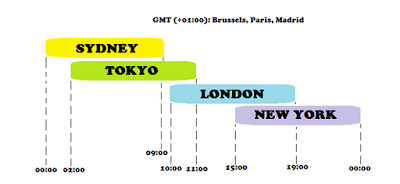Why is the Forex market so important?
Why is the Forex market so important
The currency market is the largest and most liquid financial market. However, it may be difficult for the average person to understand the purpose or function of this huge market. The currency market has many roles, unlike the stock market, which focuses mainly on facilitating the raising of funds for large companies by offering their shares to a large number of investors. This article explains the importance of the Forex market and the important role it plays within the national economy.
The Forex market is mainly for the needs of exporters, importers and foreign currency travelers. However, the forex market is not the same as the stock market that is mainly driven by investors. In other words, investors are a vital part and an indispensable necessity for the functioning of the stock market. On the contrary, it is the investor who needs the Forex market to make its foreign investments. In other words, the currency market can function normally even in the absence of investors and speculators given the large number of important functions within the body of the economy. In the following lines, we will try to list some of these vital functions.
 |
| Why is the Forex market so important |
International Trade
Exporters need to convert their foreign currency earnings from external buyers to their local currency. Similarly, importers need to convert their local currency into US dollars, for example, to buy goods from outside countries. Do not forget that big companies need to buy US dollars to establish their branches or build their warehouses and factories in other parts of the world. Currency conversion is also a necessary step to complete mergers and acquisitions. All of these needs can only be met through the Forex market.
Settlement of financial instruments
Payments are often made in the form of instruments or financial instruments (checks, bills, letters of credit, international transfers, etc.) from one country to another. This type of transaction is complex and may involve the completion of more than two banks, and here comes the role of the Forex market in determining the exchange rates used in determining the value of amounts to be added to the recipient's account.
Another example. A country may grant loans to another country to finance development projects, in which case credit lines will be opened to facilitate the work of the companies involved in these projects. Even this type of transaction requires the use of exchange rates prevailing in the Forex market to address them.
Similarly, a country may invest in debt instruments issued by another country (such as US Treasuries). Investment in debt instruments may come from a private company or an investor through the purchase of bonds issued by a company in another country. When the foreign debt instruments mature, the final repayment amount will be converted to the local currency at market rates of exchange.
Hedging
When an export company receives an order from another country, it will often take some time to process the goods and will not be shipped immediately. In this case, the buyer will open the so-called 'documentary credit' which constitutes a guarantee of payment of the goods upon receipt. Depending on the terms of the contract, the exporter may ship the purchases within a period of 45 to 60 days. During this period the value of the local currency may rise or fall against the US dollar, which affects the actual amount the seller will receive. In some bad scenarios, the issuer may suffer a loss due to exchange rates. To avoid such critical situations, the issuer stabilizes the exchange rate by entering into a contract with its dealing bank asking to use the Forex market to hedge against exchange rate fluctuations in order to protect its rights.
Hedge transactions in the Forex market also come from investors buying risky assets outside their home countries. For example, when political tensions between two countries increase (as in previous US-North Korean times), investors buy so-called safe haven currencies such as the Japanese yen and the Swiss franc. The lack of a Forex market would have made it much harder for investors to do this type of transaction within a reasonable period of time.
Control of inflation
In general, central banks operating in stable countries hold large amounts of foreign currency (the euro, the US dollar, the pound sterling, the Japanese yen, the Swiss franc and the renminbi) as part of their sovereign reserves. These reserves are used to maintain the stability of the economy. For example, when a country's economy begins to face difficulties, the central bank cuts interest rates, which in turn reduces the attractiveness of the local currency to foreign investors. Central banks also intervene in the Forex market (by selling local currency and buying foreign currency), if necessary. The purpose is to keep the local currency at competitive levels. Also, high liquidity in parallel with lower interest rates encourages consumers to increase their spending, thereby supporting economic growth.
But once inflationary pressures begin to accelerate, the central bank raises interest rates, which in turn increases the attractiveness of the national currency to foreign investors. If necessary, the central bank may intervene again in the currency market (buying local currency and selling foreign currencies) to strengthen its local currency position. Lower liquidity will reduce individuals and companies' appetite for spending, thereby avoiding the growth of the economy at a much higher rate than required, causing many problems. In other words, the central bank can use the Forex market to strengthen or weaken the national currency




No comments: